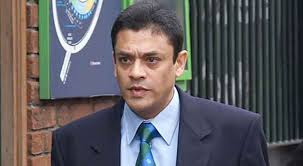Ranjan
Madugalle doesn’t give interviews. That’s a contractual bind with the
ICC he can do nothing about. His work speaks for him, it could be
argued. He ought to write a biography and I am sure it would be of
immense value to cricket lovers and the game itself.
Ranjan is
not all silence with smiles and nods though. There are times he speaks.
And sometimes people take notes or, in this case, transcribe.
What is the legacy he would like to leave behind, he was once asked. This is what he said:
‘I
look at it in the form of having done my job to the best of my ability.
In that process if I have left the game better, I will sleep well. I
will always look at it as an absolute privilege to be part of a great
game, first as a spectator, secondly as a player, for five years as a
national selector, then for a short period as a commentator, and quite a
bit as a referee. I think I have been lucky to see the game evolve from
the 1970s till now. In the process, I have made friends on and off the
field, which I value and treasure.’
It reminds one of the
oft-quoted oath taken by the young men of Athens which, Ranjan would
remember, was always inserted into the Big Match souvenir of his school.
All five years he played for Royal, in the years before and probably to
this day.
The ephebic oath, written in the mid fourth century
BC and preserved on an inscription from Acharnae, was taken by young
Athenians upon induction into the military academy, the Ephebic College,
graduation from which was a precondition for being granted citizenship.
So much for ‘democracy’ and ‘equality’ in the much celebrated Grecian
City! Not our concern here.
The oath contains the following
line: ‘My native land I will not leave a diminished heritage but greater
and better than when I received it.’
Ranjan is all Sri Lankan
and all Global Citizen or at least Citizen of the Cricketing Universe.
Cricket is a country and one which he has graced with his presence, his
heart and most importantly a mind of absolute clarity. Underlined with
integrity. He has curated this garden well and if it has bloomed or at
least survived bludgeoning at the hands of the vile, much of the credit
should go to him. If he were to depart today, he would no doubt sleep
well.
The transcriber also caught some advice he had offered
youngsters. There were four lines. We will talk about the first: ‘No
journey is a joy ride. No journey is planned. No journey is structured
the way you want.’
Let’s break it down.
It’s never a case
of easy-peasy. Never a piece of cake. Never plain sailing. There are
rough seas. There are undercurrents. There are storms. There can even be
torpedoes. Mutiny, too. So, Ranjan seems to be saying, ‘retire
illusions, young man!’ In other words, be ready for setbacks. Be ready
to change course. He doesn’t say ‘give up.’ The journey teaches.
Destinations should be kept in sight.
No journey is planned.
Well, what he probably meant was that things don’t always pan out as
expected. It’s not a bad thing to have a plan, but don’t expect things
to follow the script in your hand. Doesn’t happen that way.
The
structure of the journey. You make your journey but not in the
circumstances of your choice. This doesn’t mean that you have no say in
the matter. The structures set the parameters of the possible, but human
history has shown that these limits are not cast in stone. They are
altered by effort. Determination. Love. Commitment. They get you where
you planned to go and even beyond, regardless of constraints.
Ranjan Madugalle. His life is his story and therein are lessons he need not spell out.
Other articles in the series titled 'The Interception' [published in 'The Morning']
Do you have a plan? Strengths and weaknesses It's all about partnerships
Love this- thanks for capturing him so well!
ReplyDeleteDear Dhanya,
ReplyDeleteThere's more:
http://malindawords.blogspot.com/2012/02/ranjan-madugalle-column.html
http://malindawords.blogspot.com/2020/12/ranjan-madugalles-notes-on-leadership.html
and a few more to come! :)
Malinda